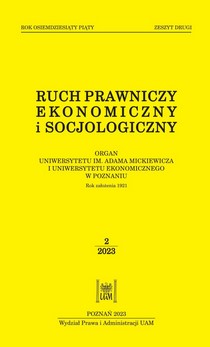JAK ZACHĘCIĆ STUDENTÓW SOCJOLOGII DO ANTYCYPACJI SPOŁECZNEJ I PROGNOSTYKI SOCIETAS FUTURA? UDZIAŁ FANTASTYKI SOCJOLOGICZNEJ W DYDAKTYCE AKADEMICKIEJ
HOW TO ENCOURAGE SOCIOLOGY STUDENTS TO ENGAGE IN SOCIAL ANTICIPATION AND SOCIETAS FUTURA FORECASTING? THE ROLE OF SOCIAL FICTION IN ACADEMIC TEACHING
Author(s): Marcin ChoczyńskiSubject(s): Social Philosophy, Culture and social structure , Higher Education
Published by: Uniwersytet Adama Mickiewicza
Keywords: social anticipation; academic teaching; social fiction; analysis of social structures and social changes;
Summary/Abstract: The subject of the article is social anticipation, contained in two different perspectives – scientific (sociological forecasting) and literary (science fiction with particular emphasis on its subgenre, i.e. sociological fiction). The intersection of these two cognitive areas made it possible to show the multifaceted nature of changes in social structures and their potential direction or character. Therefore, the considerations aimed to consider the status of social fiction in the context of contemporary sociology, as well as the possibility of its use in academic teaching. The presentation of selected forms of ‘cybernetic modelling’ of literary societies of the future made it possible to compare these constructs to the findings in the field of the conventional social sciences, including primarily in relation to stratification factors, issues of social inequality, but also mutual relations between people and communities. The main conclusion from the analyses carried out in this way was to determine the degree of saturation of the narrative of literary works from the presented area with strictly sociological elements, as well as the accuracy in their presentation and the logical sequence of development. It is worth adding here that the richness of social fiction literature results from many sources, including utopianism (issues of anti-utopias and dystopias), post-apocalyptic works, futurology and so-called alternative histories. The volume of works in the field of social fiction has also been significantly expanded – going beyond the commonly known works by Yevgeny Zamyatin, Aldous Huxley, George Orwell or Janusz A. Zajdel – and extended to contemporary novels and comic books or adaptations – both film, as well as serials. Thanks to the analyses contained in this study, sociologists can consider the use of literary social anticipations in their teaching – as a comparative material, but also as stimulating sociological forecasting itself
Journal: Ruch Prawniczy, Ekonomiczny i Socjologiczny
- Issue Year: 85/2023
- Issue No: 2
- Page Range: 253-268
- Page Count: 16
- Language: Polish

